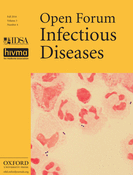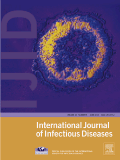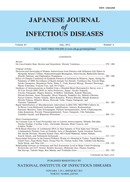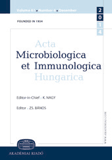
BMC INFECTIOUS DISEASES
Scope & Guideline
Advancing global health through infectious disease research.
Introduction
Aims and Scopes
- Clinical Characteristics and Outcomes of Infectious Diseases:
The journal emphasizes the clinical aspects of infectious diseases, exploring patient demographics, clinical presentations, treatment responses, and outcomes. - Epidemiological Studies:
BMC Infectious Diseases publishes research that investigates the epidemiology of various infectious diseases, tracking trends, risk factors, and population dynamics. - Microbial Resistance and Antimicrobial Stewardship:
A significant focus is placed on antimicrobial resistance, exploring resistance patterns, treatment efficacy, and the implementation of stewardship programs. - Innovative Diagnostic Approaches:
The journal features studies that develop and validate new diagnostic methods for infectious diseases, including molecular techniques and rapid tests. - Co-infections and Comorbidities:
Research addressing the complexities of co-infections, particularly in populations with underlying health conditions like HIV, is a core area of interest. - Public Health and Policy Implications:
BMC Infectious Diseases examines the broader implications of research findings on public health policies and intervention strategies.
Trending and Emerging
- COVID-19 Research and Long-term Effects:
A significant portion of recent publications focuses on COVID-19, addressing clinical outcomes, long-term effects, vaccine efficacy, and variants. - Antimicrobial Resistance in Emerging Pathogens:
There is a growing emphasis on antimicrobial resistance in newly identified pathogens, including studies on resistance mechanisms and treatment outcomes. - Innovative Treatment Approaches:
Research on novel therapeutic approaches, including the use of monoclonal antibodies and antiviral treatments, is gaining momentum. - Impact of Climate Change on Infectious Diseases:
Emerging research increasingly addresses the impact of climate change on the epidemiology and transmission dynamics of infectious diseases. - Mental Health Implications of Infectious Diseases:
The intersection of infectious diseases and mental health is becoming a more prominent area of study, particularly in the context of pandemics. - Global Health Equity and Access to Care:
There is a rising trend in research focused on health disparities, access to care, and the implications of infectious diseases on vulnerable populations.
Declining or Waning
- Traditional Infectious Disease Surveillance:
There has been a noticeable reduction in studies focusing solely on traditional surveillance methods for infectious diseases, as newer methodologies gain traction. - Single Pathogen Studies:
Research concentrating on single pathogen infections is declining, with a shift towards studies that examine co-infections or broader microbial communities. - Non-communicable Disease Intersections:
While infectious diseases remain a focus, the intersection with non-communicable diseases has seen a decrease in research output compared to previous years. - Vaccine Development for Established Diseases:
There appears to be a waning interest in vaccine development for diseases with established vaccines, as the focus shifts towards emerging infectious diseases and novel pathogens.
Similar Journals

Infectious Diseases and Clinical Microbiology
Innovating solutions for global infectious disease challenges.Infectious Diseases and Clinical Microbiology is a pivotal journal dedicated to advancing our understanding of infectious diseases through rigorous scientific research and clinical practices. Published by DOC DESIGN INFORMATICS CO LTD, this journal serves as a vital platform for researchers, healthcare professionals, and students keen on enhancing their knowledge of microbiological sciences and the clinical implications of infectious agents. With an ISSN of 2667-646X, it aims to disseminate significant findings in the field, enriching the scholarly dialogue surrounding infectious diseases. While currently operating under a traditional access model, the journal encourages global collaboration and knowledge sharing, striving to make a meaningful impact in tackling the challenges posed by infectious diseases. Its content aims to bridge the gap between laboratory research and clinical application, making it an essential resource in the contemporary landscape of global health.

ENFERMEDADES INFECCIOSAS Y MICROBIOLOGIA CLINICA
Empowering professionals with cutting-edge research in infectious diseases.ENFERMEDADES INFECCIOSAS Y MICROBIOLOGIA CLINICA is a prominent journal dedicated to the fields of infectious diseases and clinical microbiology, published by EDICIONES DOYMA S A in Spain. With an ISSN of 0213-005X and an e-ISSN of 1578-1852, the journal has been a cornerstone of research and scholarly communication since its inception in 1989. As of 2023, it holds a Q3 category ranking in Infectious Diseases, highlighting its significance in the field, alongside a Q4 ranking in the related area of Microbiology. Although the journal is not open access, it remains an essential resource for professionals, researchers, and students aiming to stay informed on advancements and studies that impact clinical practices in infectious diseases. With Scopus ranks indicating a percentile ranking in the 20th to 34th range across various sub-disciplines, ENFERMEDADES INFECCIOSAS Y MICROBIOLOGIA CLINICA continually contributes to the dialogue and development of science, fostering a deeper understanding of complex microbial interactions and disease mechanisms.

Open Forum Infectious Diseases
Leading the charge in open-access infectious disease research.Open Forum Infectious Diseases (ISSN: 2328-8957; E-ISSN: 2328-8957) is a leading open-access journal published by Oxford University Press, dedicated to advancing the field of infectious diseases. Since its inception in 2014, the journal has provided a platform for researchers to disseminate impactful findings in a rapidly evolving domain, achieving a remarkable Q1 ranking in both the Infectious Diseases and Oncology categories as of 2023. The journal encourages rigorous and innovative research, contributing significantly to global health discussions and informing best practices in clinical settings. As an open-access journal, it ensures that its content is accessible to a wide audience, fostering collaboration and knowledge sharing among researchers, professionals, and students alike. Positioned in the heart of the United States, Open Forum Infectious Diseases serves as a critical resource for the academic community, and its continued commitment to quality and relevance secures its status as an essential publication in the field.

JOURNAL OF INFECTION AND CHEMOTHERAPY
Unveiling Innovations in Infection and PharmacotherapyJOURNAL OF INFECTION AND CHEMOTHERAPY, published by Elsevier, is a leading journal in the fields of Infectious Diseases, Microbiology, and Pharmacology. With a solid reputation reflected in its prestigious Q2 ranking in Infectious Diseases and Pharmacology, and Q3 in Microbiology (medical), this journal serves as a vital resource for researchers, clinicians, and students interested in the latest advancements in the diagnosis, treatment, and prevention of infectious diseases. The journal provides a platform for high-quality, peer-reviewed scholarly articles, making it an essential reference point in the medical community. Despite being published without open access, it continues to attract significant scholarly attention, as denoted by its rankings in Scopus, which showcases its impact within the academic landscape. With a timeline converging from 1995 to 2024, JOURNAL OF INFECTION AND CHEMOTHERAPY is dedicated to advancing knowledge and contributing to better health outcomes globally.

Revista de Epidemiologia e Controle de Infeccao
Bridging Knowledge and Practice in Infection ManagementRevista de Epidemiologia e Controle de Infeccao, published by Universidade de Santa Cruz do Sul, stands as a vital resource for scholars and practitioners in the fields of epidemiology and infection control. This open-access journal, available since 2011, fosters the dissemination of high-quality research and practice-based knowledge aimed at enhancing public health and improving infection management strategies. With its commitment to sharing invaluable insights from Brazil and beyond, the journal encourages broader participation in critical discussions surrounding infectious diseases. Although specific metrics such as the HIndex and Scopus rankings are currently omitted, the journal's relevance is underscored by its open accessibility, allowing a global audience of researchers, healthcare professionals, and students to engage with innovative studies and findings in this essential area of public health.

INTERNATIONAL JOURNAL OF INFECTIOUS DISEASES
Empowering public health through open access research.INTERNATIONAL JOURNAL OF INFECTIOUS DISEASES, published by ELSEVIER SCI LTD, stands as a leading platform in the realm of infectious diseases, contributing significantly to the global understanding of this critical field. With an impressive impact factor, the journal maintains a distinguished Q1 ranking across various categories, including Infectious Diseases, Medicine (miscellaneous), and Medical Microbiology, demonstrating its high relevance and influence among contemporary research. Since its inception in 1996, it has embraced an Open Access model, allowing for wider dissemination of essential research findings that can inform public health policies and clinical practices. With a commitment to advancing scientific knowledge, this journal is not only a vital resource for researchers and professionals but also serves as an invaluable educational tool for students interested in the complexities of infectious diseases and their management. For those looking to stay at the forefront of research and innovation in this field, the INTERNATIONAL JOURNAL OF INFECTIOUS DISEASES is an indispensable resource.

International Journal of Mycobacteriology
Innovating solutions for mycobacterial infections worldwide.International Journal of Mycobacteriology is a peer-reviewed, open-access journal published by Wolters Kluwer Medknow Publications that specializes in the field of infectious diseases with a particular emphasis on mycobacterial research. Since its inception in 2012, this journal has emerged as a vital resource for researchers, healthcare professionals, and students aimed at advancing understanding and treatment of mycobacterial infections, including tuberculosis. With the journal being indexed in Scopus and holding a Q3 ranking in both Infectious Diseases and Microbiology (medical) for 2023, it reflects a substantial contribution to scholarly discourse in these domains, despite its current ranking positioning. Authors and readers benefit from the open access model, ensuring widespread dissemination of research findings and fostering collaboration across the global health community. Located in Mumbai, India, the journal continues to thrive with a commitment to quality research and innovation, welcoming contributions that further the exploration of mycobacteriology throughout the converged years from 2012 to 2024.

JAPANESE JOURNAL OF INFECTIOUS DISEASES
Exploring innovative solutions to combat infectious diseases.The Japanese Journal of Infectious Diseases, published by the National Institute of Infectious Diseases in Japan, serves as a vital platform for researchers, clinicians, and public health professionals committed to advancing the field of infectious disease science. With an ISSN of 1344-6304 and an E-ISSN of 1884-2836, this journal has maintained its academic rigor since its inception in 1961 and continues to contribute significantly to the global understanding of infectious diseases. The journal holds a Q3 ranking in the categories of Infectious Diseases, Miscellaneous Medicine, and Medical Microbiology as of 2023, reflecting its important role in disseminating impactful research. With many articles available through Open Access, it ensures wide accessibility to the latest discoveries and insights. Researchers can expect to find high-quality studies that address critical challenges in the control and prevention of infectious diseases, making this journal an essential resource for anyone engaging in this critical field.

ACTA MICROBIOLOGICA ET IMMUNOLOGICA HUNGARICA
Shaping the future of microbiological inquiry.ACTA MICROBIOLOGICA ET IMMUNOLOGICA HUNGARICA is a distinguished academic journal published by AKADEMIAI KIADO ZRT, focusing on significant advancements in the fields of microbiology, immunology, and infectious diseases. Established in 1994, this journal serves as a vital platform for researchers, professionals, and students keen on exploring the complexities of microbial interactions and immune responses. With a current Impact Factor reflecting its rank within the Q3 categories for Immunology, Microbiology, and Infectious Diseases, it retains a critical position in disseminating innovative research. Although not open access, the journal provides extensive insights disseminated through various academic databases, ensuring a broad reach within the scholarly community. Its convergence over three decades indicates a robust commitment to excellence in scientific inquiry and knowledge sharing. As it moves towards the future, ACTA MICROBIOLOGICA ET IMMUNOLOGICA HUNGARICA continues to uphold its legacy of fostering collaborative research initiatives that contribute to the understanding and treatment of microbial diseases globally.

Journal of Clinical Virology Plus
Advancing understanding in virology and infectious diseases.The Journal of Clinical Virology Plus, published by Elsevier, is an essential resource for researchers and professionals in the fields of virology and infectious diseases. Launched in 2021, this journal aims to bridge the gap between clinical research and application, fostering a deeper understanding of viral pathogenesis, diagnostics, and therapeutic strategies. With an ISSN of 2667-0380, this open-access journal brings cutting-edge findings to the global scientific community, facilitating the rapid dissemination of knowledge critical for advancing public health. Positioned in the Q3 category for both Infectious Diseases and Virology in 2023, its ranking reflects its growing influence and relevance in the academic landscape. The journal strives to support innovative research, collaborative studies, and comprehensive reviews that address contemporary challenges in clinical virology. As it converges through the years from 2021 to 2024, Journal of Clinical Virology Plus aims to be a central hub for vital discussions and breakthroughs in this dynamic field.